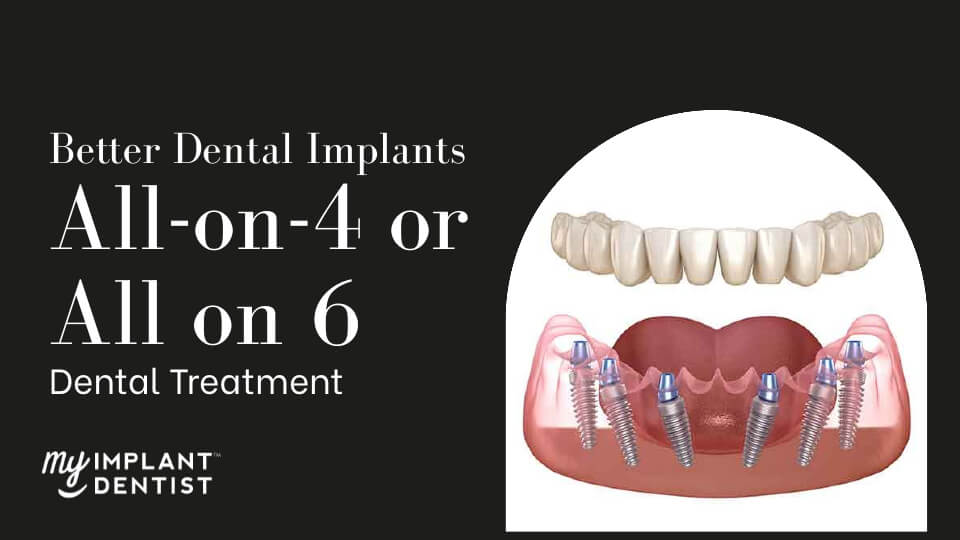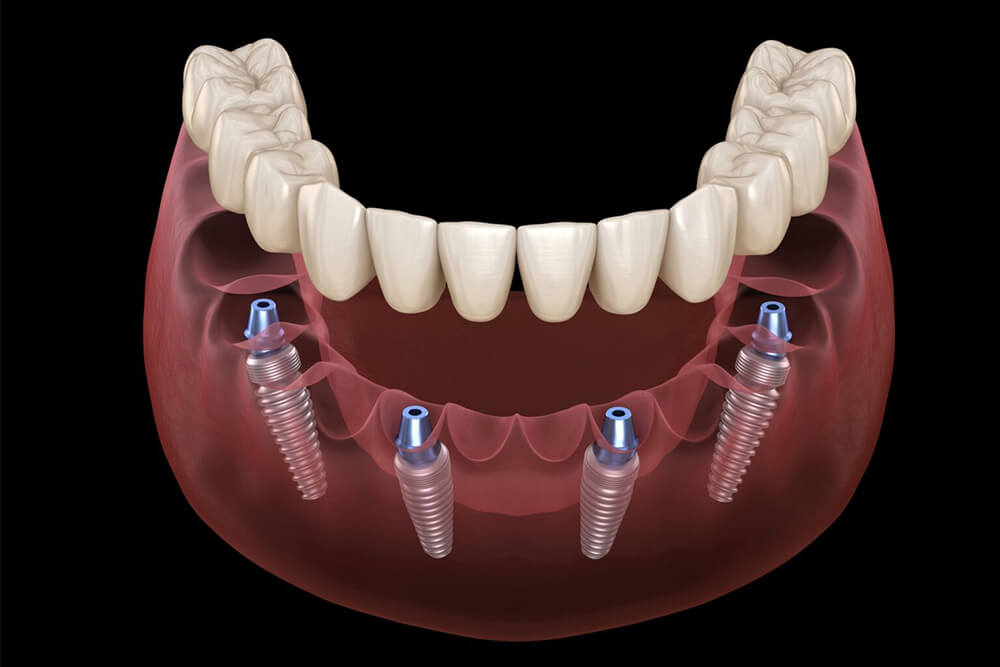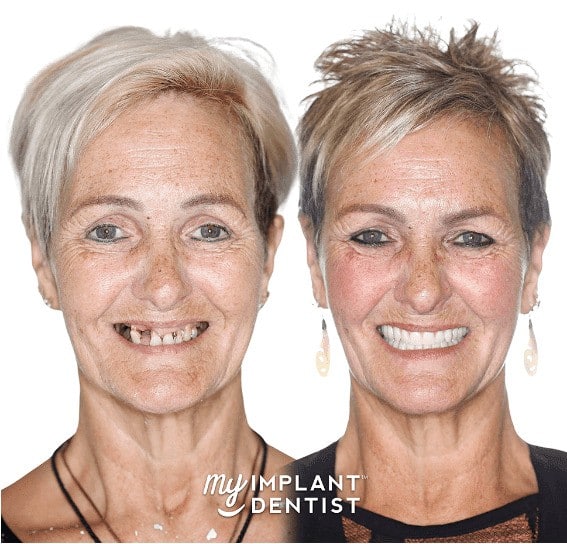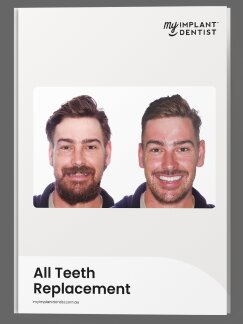Contents
Most patients can use All-on-4 dental implants, but if you want more artificial teeth or have a strong bite, All-on-6 might be a better choice. All-on-6 implants can handle biting and chewing pressure better because they distribute the force across more implants. However, the amount of bone you have in your jaw could be the deciding factor, as All-on-4 implants need less bone than All-on-6. Also, keep in mind that All-on-6 implants cost more than All-on-4.
Are you thinking about getting dental implants to replace your teeth? You may have been wondering what the difference between All-on-4 and All-on-6 dental implants is – look no further.
In this article, we’ll explore the similarities and differences between these implants, the factors that you and your dentist will consider making the choice, and the cost difference between these implants.
What are All-on-4 Dental Implants?
Developed by Dr. Paulo Malo and Nobel Biocare, All-on-4 implants are a type of dental prosthesis that provide patients with a fixed and near-permanent solution to replace their missing teeth. The implants form the foundation for the upper or lower arch (row) of artificial teeth, supporting the dental implant bridge. This treatment is aimed at individuals who have no teeth or many teeth that need to be replaced.
The All-on-4 procedure involves titanium implants (aka anchors or posts) being placed directly into the jawbone. As they are inserted directly into the bone, the implants will stay in position for at least the next 20 years (if the proper care is followed).
Before the implants can be placed into the jawbone, all of the teeth and any infected gum or bone tissue will need to be extracted. Four implants are placed in either the upper or lower jaw, depending on where replacements are required. Two straight implants will usually be placed in the front, and two angled or tilted implants will be placed at the back. On the upper jawbone, implants are inserted at an angle to avoid hitting the sinus cavities, whereas implants are angled on the lower jawbone to avoid hitting a major nerve. Angled implants can also be used to extend your smile.
Your dentist will place abutments, called Multiunit abutments on top of the implants – abutments act as connectors between the implants and the artificial teeth. You will then have tailor-made, temporary artificial teeth fitted onto your abutments. This temporary set of teeth is used to give your jawbone and implants time to heal and osseointegrate (fuse together). Finally, 3 to 6 months later, you’ll get your stronger, permanent teeth fitted to your implants.
All-on-4 vs. All-on-6: Differences
There are a few differences between these procedures, but the main difference is the number of implants: an All-on-6 procedure will use six dental implants instead of four. Notably, All-on-4 dental implants are suitable for the majority of patients.
We’ve summarised the key differences between All-on-4 and All-on-6 dental implants in the table below.
| All-on-4 | All-on-6 | |
|---|---|---|
| Number of implants | 4 | 6 |
| Average number of teeth supported | 5 to 6 per quadrant / 10 to 12 per arch |
6 or 7 per quadrant / 12 or 14 per arch |
| Biting and chewing | Good force distribution | Excellent force distribution |
| Bone grafting* | Rarely on bottom jaw / 5% of cases need bone grafting |
Rarely on bottom jaw / 5–7% of cases need bone grafting |
*Bone grafting is often necessary for single implants, but rarely necessary for All-on-4 or All-on-6.
All-on-4 vs. All-on-6: How Do You choose?
Bone mass and bone density are critical determining factors; however, there isn’t a one-size-fits-all answer to this question. The choice and number of implants required are tied to several factors that impact your individual dental health situation, such as how many of your natural teeth are missing, and whether you have gum disease (as well as its severity if you do). If necessary, your dentist will work out a personalised plan to treat your gum disease to get your gums into a healthy, optimum condition for your implants.
Your dentist may also suggest top implants if your jawbone is insufficient or too soft to support your implants.These implants engage different bones to support your implants; zygomatic implants engage the cheekbone, whereas pterygoid implants engage the pterygoid plates at the very back of the jaw. Due to the success of these extra maxillary implants, they are becoming more popular.
Other factors to consider include whether you have diabetes or osteoporosis. Your dentist will take a cone beam CT (CBCT) scan to investigate each of these. If there is another condition that has affected the underlying structure of your jaw, you may not be able to get All-on-4 or All-on-6 implants to replace a full arch. Such conditions include extreme skeletal malalignments, insufficient bone volume, or a bimaxillary joint disorder.
Do All-on-4 or All-on-6 Implants Last Longer?
With the proper care, both All-on-4 and All-on-6 implants can last for 20 years or more. This longevity is aided by osseointegration, where the bone and implant posts fuse together. The implant posts will rarely need to be replaced, but the denture will wear out over time and may need to be replaced after 15 to 20 years. As you age, your teeth and gums can continue to change and move, so some dentists also recommend going in for check-ups every one to two years to ensure that the implants are still functioning and positioned as intended.
All-on-4 vs. All-on-6: Cost in Australia
After your first consultation, our clinic will send you a quote for your specific treatment requirements. We’ve summarised the costs of All-on-4 and All-on-6 implants in the table below; however, note that these are only intended to serve as a guideline and do not include any additional dental procedures that you may require, such as bone grafting or gum disease treatment.
| All-on-4 | All-on-6 | |
|---|---|---|
| Upper arch | From $19,000 per jaw | $19,000 |
| Lower arch | From $19,000 per jaw | $19,000 |
| Upper and lower arches | From $38,000 | $50,000 |
You should also have a look at our payment plans for dental implants.
At My Implant Dentist, our dentists have years of experience and extensive training. Your dental implants will always start with a thorough examination, detailed consultation, and an individualised treatment plan.
Contact our clinic on (08) 9361 5544 in Perth or (07) 3130 0077 in Brisbane today to book a consultation and get a quote for your treatment.






















